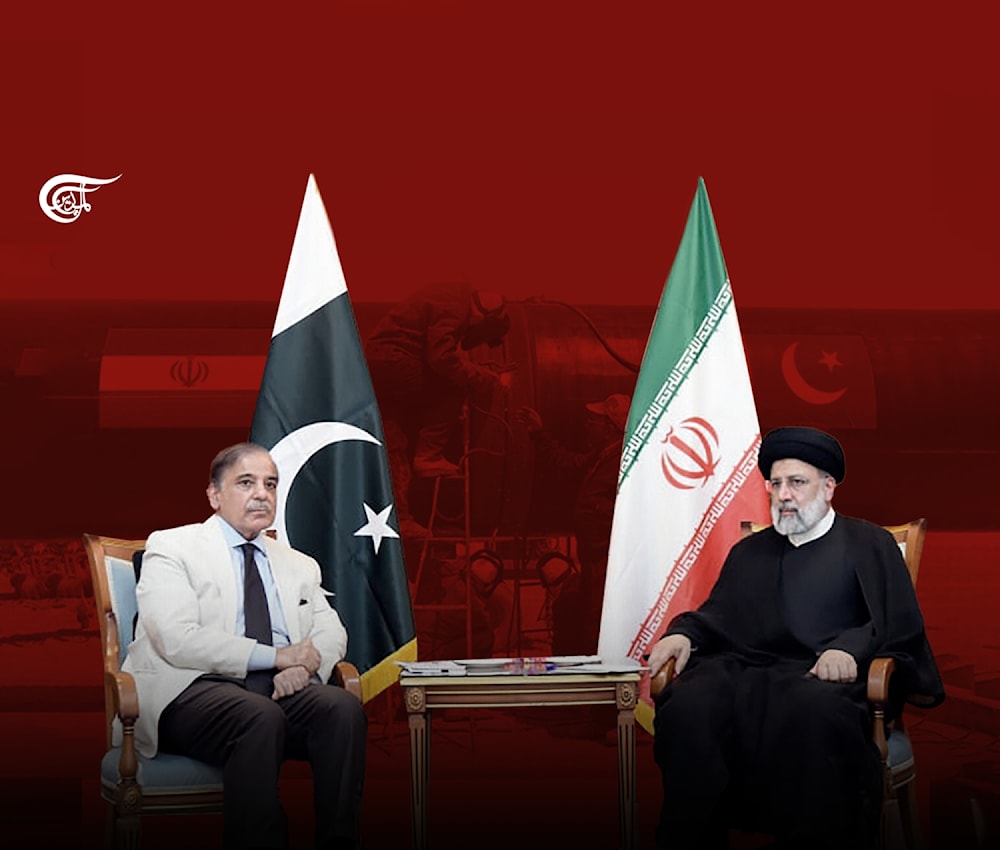Iran-Pakistan Gas pipeline powerplay
The Iran-Pakistan gas pipeline project represents more than just an energy agreement—it symbolizes Pakistan's autonomy, resilience, and determination to pursue its national interests despite external pressures.
-

The significance of peace and collaboration between Iran and Pakistan has surged following "Israel's" feeble attempt to target Iran's military installations in Isfahan (Illustrated by Hadi Dbouk to Al Mayadeen English)
Iranian President Ibrahim Raisi is gearing up for a pivotal two-day visit to Pakistan starting April 22. The visit, at the invitation of Pakistani President Asif Ali Zardari, promises discussions on a broad spectrum of issues, ranging from security cooperation to the possibility of a free trade agreement. Of particular interest will be progress on the long-awaited Pakistan-Iran gas pipeline and strategies to navigate the maze of US sanctions.
The timing of President Raisi's visit is critical. Just a few days prior, Iran made headlines by launching strikes on "Israel"—a bold move marking the first direct attack on its arch-enemy. This retaliation stemmed from "Israel's" strike on the Iranian consulate in Damascus, resulting in the loss of Iran's elite Islamic Revolution Guard Corps (IRGC) senior commanders Mohammed Reza Zahedi and Mohammad Hadi Haji Rahimi.
The significance of peace and collaboration between Iran and Pakistan has surged following "Israel's" feeble attempt to target Iran's military installations in Isfahan. Iranian state media reported that Iran's air defenses successfully intercepted three small drones over the central city of Isfahan, mere hours after US officials, citing Israeli sources, claimed Israeli missiles had struck an Iranian site.
Reports from Iranian state television indicated explosions in Isfahan as air defenses were activated, prompting the suspension of flights across several areas, including Tehran and Isfahan. Contrary to initial speculation, Iranian media clarified that the attack originated from within Iran, likely carried out using small quadcopters. Additionally, Iranian sources accused certain US media outlets of propagating disinformation in support of Israeli interests, labeling it a proxy war of misinformation.
Beyond bilateral concerns, discussions during the visit will inevitably delve into the tensions between Iran and "Israel", as well as "Israel's" war on Gaza. However, amidst this geopolitical turbulence, a glimmer of hope emerges for the Iran-Pakistan (IP) gas pipeline.
Driven by necessity and sustained by the current global climate, Pakistan is laser-focused on kickstarting and swiftly completing an initial 80-kilometer stretch of the pipeline. Originally envisioned as a 785-kilometer lifeline from the Iran border through Balochistan to Sindh and Punjab, this scaled-down ambition aims for rapid progress.
Iran has already upheld its end of the bargain by constructing its seventh cross-country gas pipeline—an impressive 1,172-kilometer stretch from Asalouyeh to Iranshahr, with an additional 270 kilometers to the Pakistan border.
Salman Bashir, a former foreign secretary, underscores the urgency of prioritizing Pakistan's interests. He said: “If Pakistan was to prioritize its own interests, the IP gas pipeline would be completed. Given Iran’s abundant gas resources and our pressing need, there is no justification for delay. A foreign policy centered on prioritizing relations with neighbors is imperative,”
Pakistan's natural gas woes paint a grim picture, with 69% of reserves depleted and a staggering 78% of households lacking access to natural gas. This scarcity leads to extensive load shedding for those fortunate enough to have access, crippling both households and industries alike.
Iran boasts an impressive estimated 1,200 trillion cubic feet (TCF) of natural gas reserves, ranking second globally after Russia. However, stringent US sanctions hinder its energy exports, stifling its export potential and hindering trade on the global stage. The Iran-Pakistan pipeline project has encountered numerous obstacles, particularly in the wake of the US invasion of Afghanistan in the post-9/11 era. The resulting turmoil and militancy in Baluchistan dealt a severe blow to the project.
US officials have consistently opposed the gas pipeline between Iran and Pakistan, exerting significant economic pressure on Pakistan. Most recently, US Secretary of State’s spokesman Matthew Miller reiterated the US stance against the project, warning of potential sanctions for engaging in business with Iran. Pakistan faces the looming threat of a hefty penalty of $18 billion—three times its current foreign exchange reserves—should it fail to prioritize the completion of the IP gas pipeline project.
As a sovereign nation, Pakistan possesses the autonomy to make decisions in the best interests of its people. The lingering question remains: how long will Pakistan continue to compromise its independence? Sovereignty and self-respect are fundamental attributes of statehood, and Pakistani authorities must uphold these principles to safeguard the nation's integrity and prosperity.
The prevailing scenario underscores the ineptitude and subservience of the Pakistani leadership, who concede to external pressures despite Pakistan's sovereign status. This subservience undermines the country’s foreign policy and erodes its national sovereignty. Pakistan can draw lessons from its neighbors—China and India—which continue to import Russian oil despite Western opposition amidst the Ukraine conflict. Why should sanctions selectively apply to Pakistan?
The gas pipelines and the Iranian visit are instrumental in promoting stability in the region, both in terms of security and economy. By strengthening energy cooperation and infrastructure development, these initiatives lay the groundwork for long-term stability and prosperity. Additionally, high-level diplomatic exchanges foster dialogue and trust among nations, paving the way for peaceful resolution of conflicts and enhanced regional cooperation.
Pakistan stands at a critical juncture where its sovereignty and economic interests intersect. The Iran-Pakistan gas pipeline project represents more than just an energy agreement—it symbolizes Pakistan's autonomy, resilience, and determination to pursue its national interests despite external pressures. As Pakistan navigates the complexities of geopolitics and economic challenges, it must prioritize the completion of the pipeline project to secure its energy future and assert its sovereignty on the global stage. By upholding its independence and pursuing strategic partnerships that serve its long-term interests, Pakistan can emerge stronger and more resilient in the face of adversity.

 Ghanwa Mohiyuddin
Ghanwa Mohiyuddin
 6 Min Read
6 Min Read









